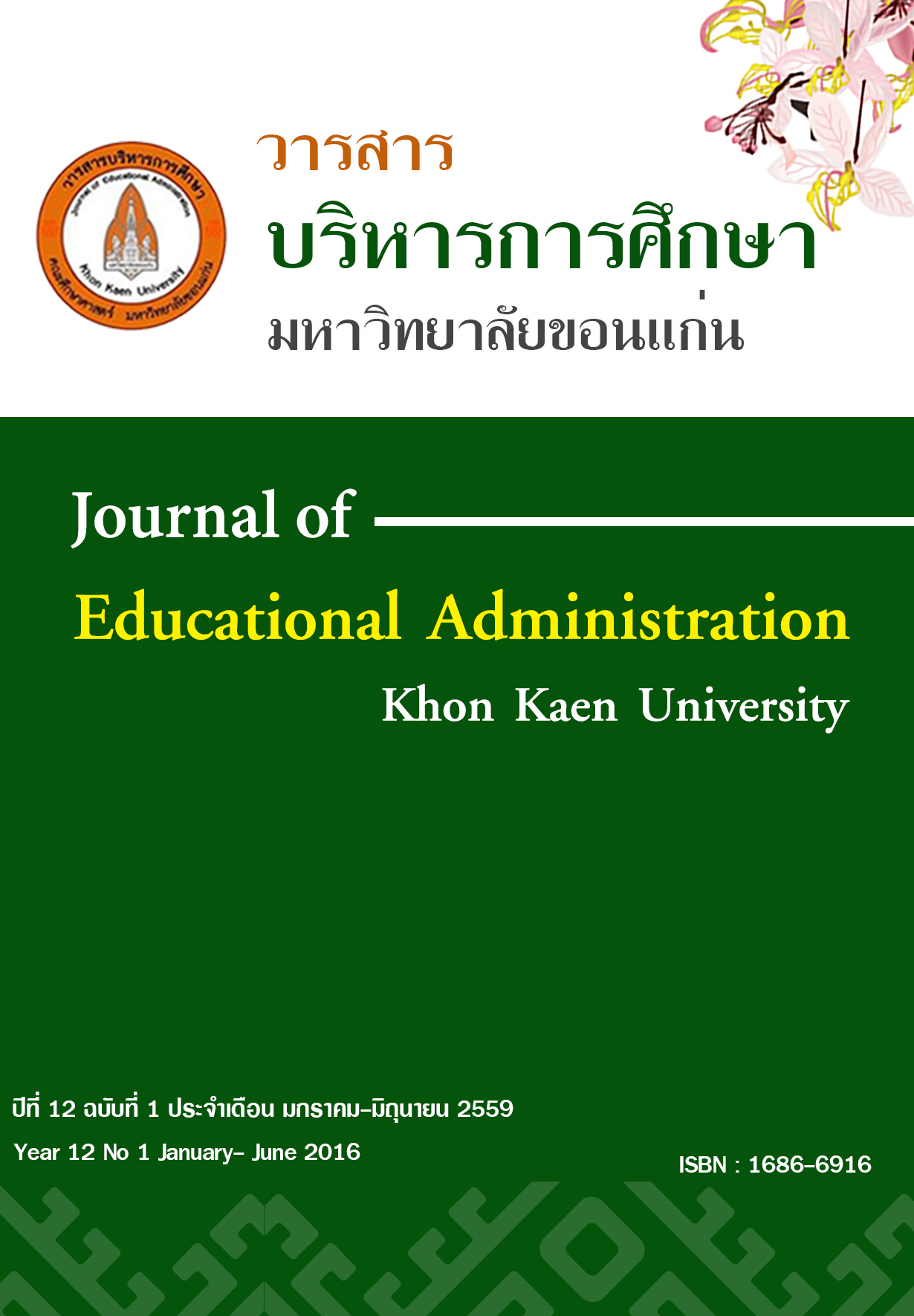ข้อเสนอเชิงนโยบายการบริหารจัดการศึกษาโรงเรียนศูนย์เด็กปฐมวัยต้นแบบ ในจังหวัดชัยภูมิ Proposed Policy for Educational Management of the Model Early Childhood School Development Center in Chaiyaphum Province
Main Article Content
บทคัดย่อ
การวิจัยครั้งนี้มีวัตถุประสงค์เพื่อ 1) ศึกษาและพัฒนาข้อเสนอเชิงนโยบายการบริหารจัดการศึกษาโรงเรียนศูนย์เด็กปฐมวัยต้นแบบในจังหวัดชัยภูมิ และ 2) ตรวจสอบความสอดคล้อง ความเหมาะสม ความมีประโยชน์ และความเป็นไปได้ของข้อเสนอเชิงนโยบายการบริหารจัดการศึกษาโรงเรียนศูนย์เด็กปฐมวัยต้นแบบจังหวัดชัยภูมิ ดำเนินการวิจัยเป็น 3 ระยะ คือ ระยะที่ 1 การศึกษาแนวคิดการสร้างข้อเสนอเชิงนโยบาย ประกอบด้วย 3 ขั้นตอน คือ การศึกษาวิเคราะห์และสังเคราะห์เอกสาร การสัมภาษณ์เชิงลึกผู้ทรงคุณวุฒิด้านการบริหารจัดการศึกษาปฐมวัย และกรณีศึกษาโรงเรียนปฐมวัยที่ประสบความสำเร็จ ทำการสังเคราะห์เนื้อหา แล้วจัดทำร่างข้อเสนอเชิงนโยบาย ระยะที่ 2 การตรวจสอบข้อเสนอเชิงนโยบาย โดยดำเนินการจัดประชุมสัมมนาผู้มีส่วนได้ส่วนเสีย กลุ่มตัวอย่างได้แก่ ผู้บริหาร ครูและผู้ปกครองนักเรียนโรงเรียนศูนย์เด็กปฐมวัยต้นแบบในจังหวัดชัยภูมิ จำนวน 70 คน ระยะที่ 3 การประเมินข้อเสนอเชิงนโยบาย โดยการสนทนากลุ่มผู้ทรงคุณวุฒิ ซึ่งเป็นผู้บริหารระดับเขตพื้นที่การศึกษา ศึกษานิเทศก์ ผู้บริหารและครูโรงเรียนศูนย์เด็กปฐมวัยต้นแบบในจังหวัดชัยภูมิ จำนวน 15 คน เครื่องมือที่ใช้ในการเก็บรวบรวมข้อมูลเป็นแบบประเมินมาตรประมาณค่า 5 ระดับ แบบสัมภาษณ์เชิงลึกแบบกึ่งโครงสร้างชนิดปลายเปิด และแบบสังเกต วิเคราะห์ข้อมูลเชิงปริมาณด้วยสถิติพื้นฐาน และวิเคราะห์ข้อมูลเชิงคุณภาพด้วยการวิเคราะห์เนื้อหา
ผลการวิจัย พบว่า 1. ข้อเสนอเชิงนโยบายการบริหารจัดการศึกษาของโรงเรียนศูนย์เด็กปฐมวัยต้นแบบในจังหวัดชัยภูมิ ประกอบไปด้วย 7 ด้าน คือ 1) ด้านการบริหารจัดการ 2) ด้านการใช้และพัฒนาหลักสูตร 3) ด้านการให้บริการ 4) ด้านคุณภาพผู้เรียน 5) ด้านสื่อและแหล่งเรียนรู้ 6) ด้านบุคลากร และ 7) ด้านความสัมพันธ์ระหว่างสถานศึกษา ครอบครัวและชุมชน 2. ผลการประเมินข้อเสนอเชิงนโยบายการบริหารจัดการศึกษาโรงเรียนศูนย์เด็กปฐมวัยต้นแบบในจังหวัดชัยภูมิ มีความสอดคล้อง ความเหมาะสม ความมีประโยชน์ และความเป็นไปได้ อยู่ในระดับมากที่สุด ทุกด้าน
The purposed of this research were 1) to study and develop a policy for management of the Model Early Childhood Center schools in Chaiyaphum Province and 2) to examine the congruence, appropriateness, usefulness, and possibility of the propose policy developed. The research methodology was divided into three phases: Phase 1 – the study of proposed policy development through the following steps, step 1 documentary analysis and synthesis, step 2 in-depth interview with nine experts in educational management at early childhood level, and step 3 multi-case study of successful early childhood schools, then the results from the aforementioned three steps were synthesized for policy draft; phase 2 check of the propose policy draft through organizing conferences among the stakeholders the sample group of which included seventy administrators, teachers, and parents from Model Early Childhood Schools in Chaiyaphum Province and; phase 3 evaluating of the propose policy draft through focus–group the sample group of which included 15 administrators from educational
service area office, educational supervisors, and early childhood school administrators and teachers. The research instruments consisted of five – point rating scale evaluation from, open–ended semi– structured interview, and observation form. Quantitatively data were analyzed using basic statistical techniques and
qualitatively analyzed in description.
The findings revealed as follow : 1. The proposed policy for educational management of the Model Early Childhood School Center in Chaiyaphum Province existed 7 issues. There were 1) management approach, 2) curriculum development and implementation, 3) service, 4) learner’s quality, 5) medias and learning sources, 6) personnel, and 7 school – family – community relation. 2. Based on the evaluation of
congruence, appropriateness, usefulness, and possibility, the proposed policy gained the highest level of
the five – point Likert’s scale.


